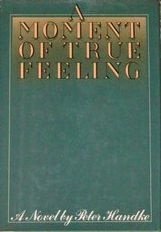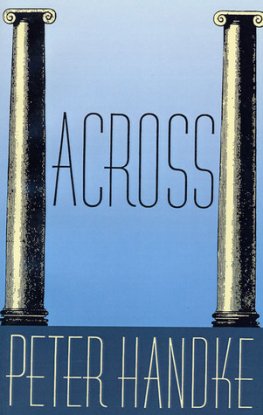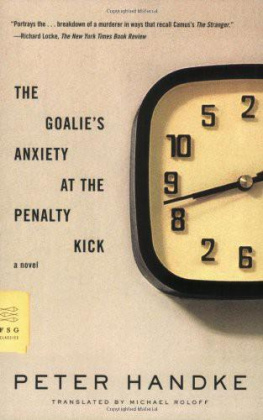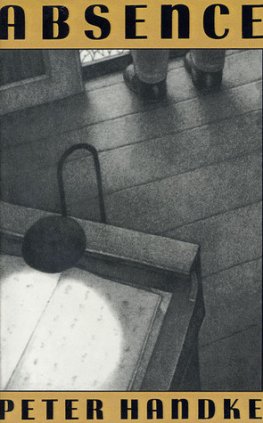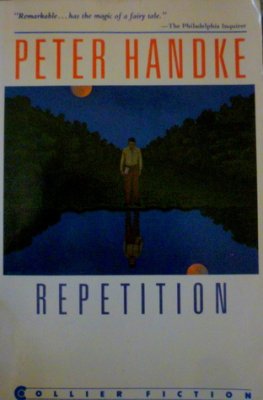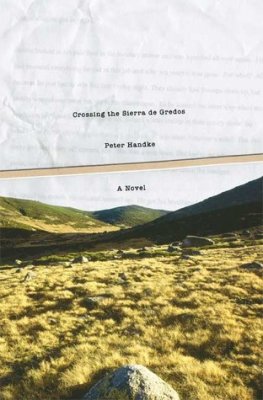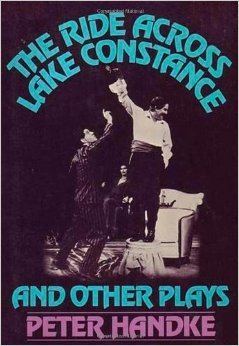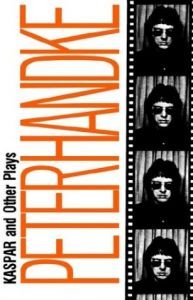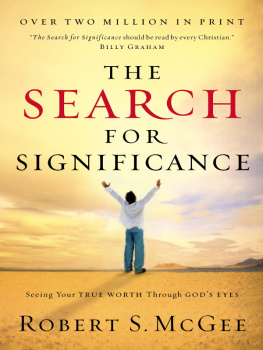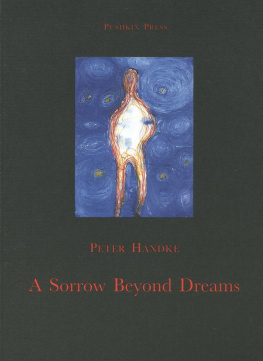Peter Handke
Moment of True Feeling
Violence and inanity are they not ultimately one and the same thing?
M. HORKHEIMER
Who has ever dreamed that he has become a murderer and from then on has only been carrying on with his usual life for the sake of appearances? At that time, which is still going on, Gregor Keuschnig had been living in Paris for some months, serving as press attach at the Austrian embassy. He, his wife, and their four-year-old daughter Agnes occupied a dark apartment in the 16th arrondissement. The building, which dated from the turn of the century and reflected the bourgeois comfort of the period, had a stone balcony on the second floor and a cast-iron balcony on the fifth floor. It was situated, side by side with similar apartment houses, on a quiet boulevard sloping gently downward to the Porte dAuteuil, one of the western exits from the city. Every five minutes or so, in the daytime hours, the glasses and dishes in the dining-room cupboard rattled when a train passed in the railroad cut that ran parallel to the boulevard, carrying passengers from the periphery of Paris to the Gare Saint-Lazare in the center of the city, where if they wished they could change to trains that would take them northwestward to the Channel, to Deauville or Le Havre, for instance. (Some of the older people in this neighborhood, which as late as a hundred years ago consisted partly of vineyards, chose this mode of travel when they went to the seaside with their dogs for the weekend.) But after nine oclock at night the trains stopped running, and then it was so quiet on the boulevard that the leaves of the plane trees outside the windows could be heard rustling from time to time in the breeze that is frequent in Auteuil. On such a night at the end of July, Gregor Keuschnig had a long dream, which began with his having killed someone.
All at once he had ceased to belong. He tried to change, as an applicant for a job undertakes to change; but for fear of being found out he had to go on living exactly as before and, above all, remain exactly as he had been. Even to sit down as usual to a meal with other people was to dissemble; and if he suddenly began to talk so much about himself and his past life, it was only to divert attention from himself. Oh, the disgrace to my parents, he thought, while the victim, an old woman, lay in an inadequately buried wooden box: a murderer in the family! But what oppressed him most was that he had become someone else, yet had to keep behaving as if he were still himself. The dream ended with a passer-by opening the wooden box, which in the meantime seemed to have moved to the sidewalk outside his house.
Formerly when Keuschnig found something unbearable, he had tended to lie down somewhere by himself and go to sleep. This night the opposite happened: his dream was so intolerable that he woke up. But waking was as impossible as sleeping only more absurd, more tedious, as though he had begun an endless term of imprisonment. Something had been done that could never be undone. He folded his hands under his head, but this habitual action had no remedial effect. Dead calm outside his bedroom window; and when after a long while a branch of the evergreen tree in the courtyard stirred, he had the impression that it had been moved, not by a gust of wind, but by the accumulated inner tension of the branch itself. It occurred to Keuschnig that there were six more stories above his ground-floor apartment, one on top of another! probably packed full of heavy furniture, of dark-stained cupboards. He did not remove his hands from under his head, but only puffed up his cheeks as though for self-protection. He tried to imagine how his life would go on. Because everything had lost its validity, he could imagine nothing. He rolled up in a ball and tried to get back to sleep. Falling asleep had ceased to be possible. When finally, with the passing of the first train at about six, the water glass on the bedside table tinkled, he mechanically got out of bed.
Keuschnigs apartment was large and intricate. In it two people could take different itineraries and suddenly meet. The long hallway seemed to stop at a wall, but then after a bend it continued on you wondered if you were still in the same apartment to the back room, where his wife sometimes did her homework for her audio-visual French course and stayed the night when, as she said, she was too tired to face the spooky corridor with its abrupt twists and turns. The apartment was so intricate that, though the child couldnt actually get lost, they were forever calling: Where are you? The childs room could be entered from three sides: from the hallway, from the back room, which his wife called her study, and from the parents bedroom, so called only in the presence of visitors they didnt know very well. The front of the apartment consisted of the dining room, the kitchen, the servants entrancethey had no servants and a special servants toilet (the bolt of which, strange to say, was outside the door), and directly on the street, the two salons, which his wife spoke of as livings, while in the lease one of them was termed library because of a niche in the wall. The small vestibule opening out on the street was called antichambre in the lease. The rent came to three thousand francs a month, the sole income of an elderly Frenchwoman, whose husband had once owned plantations in Indochina. Two thirds of this sum was paid by the Austrian Foreign Ministry.
Keuschnig looked at his sleeping wife through the half-open door to the back room. He wished that the moment she woke up she would ask him what he was thinking about. He would reply: Im looking for a way of thinking you out of my life. Suddenly he wished he would never see her or hear of her again. He wished she would be shipped away somewhere. Her eyes were closed; from time to time her wrinkled lids stretched smooth. That told him she was beginning to wake up. Now and then there were gurglings from her belly; the chirping of two sparrows outside the window, a remark, then an answer, always a few notes higher; separate sounds became distinguishable in what had been the even murmur of the city during the night. There was already traffic enough that the screeching of brakes could be heard and farther away the blowing of a horn. His wife still had her earphones on, and a language record was still turning on the record player. He switched off the machine and she opened her eyes. With open eyes she looked younger. Her name was Stefanie, and only yesterday she had aroused feelings in him, at least occasionally. Why didnt she notice anything peculiar about him? Youre already dressed, she said, and took off the earphones. In that moment he felt capable of kneeling down and telling her everything, everything. Where should he begin? Once or twice in the past he had placed his thumb on her throat, not as a threat but as one kind of contact among many others. Only if she were dead, he thought, would I be able to feel something for her again. Standing still and straight, he turned his head to one side as in a rogues gallery photograph, and said only, as though repeating something he had often said before: You dont mean a thing to me. The thought of growing old with you is more than I can bear. Your mere existence drives me to despair. That rhymes, she said. True enough. His last two sentences rhymed he hadnt noticed it in time and therefore couldnt be taken seriously. Closing her eyes, she asked: Whats the weather like today? and he replied, without looking out: High clouds. She smiled and dropped off to sleep. Im coming away empty-handed, he thought. Strange. Everything he did struck him as strange that morning.
In the childs room he felt as though he were taking leave of something; not only of the child, but of the kind of life that had been right for him up until then. Now no kind of life was right for him. He stood there amid the scattered toys, and suddenly in his helplessness one of his knees gave way. He crouched down. I have to busy myself with something, he thought, already exhausted by the short time spent without imagination, and busied himself putting the laces, which the child had taken out of her shoes the night before, back in again. As Agnes slept, he could see nothing of her face; her hair had tumbled over it. He put his hand on her back to see how she was breathing. She was breathing so peacefully and smelled so warm that he remembered certain of the old days when everything seemed to be gathered under a wide dome and to belong together, when for instance he had involuntarily said Agnes to his wife and involuntarily said Stefanie to Agnes. Now that was gone; he couldnt even remember it any longer. When Keuschnig stood up, he had the feeling that his brain was gradually cooling. He pulled down the skin of his forehead and closed his eyes firmly, as though that might warm his insensible brain. From today on, he thought, I shall be leading a double life. No, no life at all: neither my usual life nor a new one, for I shall only be pretending to live my usual life, and my new life will consist solely in pretending to live as usual. I no longer feel in place here, but I cant conceive of being in place anywhere else; I cant conceive of continuing to live as Ive lived up until now, but no more can I conceive of living as someone else lived or lives. The thought of living like a Buddhist monk, a pioneer, a philanthropist, a desperado, doesnt repel me, I merely find it unthinkable. I cant live

